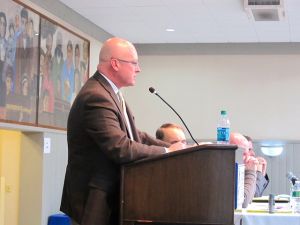
Recent attacks on U.S. diplomatic missions throughout the Middle East could signal the end of clashes between Arab Muslims and the western world – or herald many more conflicts to come, according to a Catholic Relief Services expert on the region.
“There’s no question about it,” Mark Schnellbaecher said in an interview, “we could be seeing the beginning of the end, or this could just be the beginning.”
Schnellbaecher served as the CRS regional director of Eastern Europe and the Middle East for CRS, covering everywhere from Iraq to Bosnia. Stationed in Beirut for the past eight years, Schnellbaecher came to Cabrini under a joint fellowship between the college and Villanova that will last through December.
He’s enrolled in classes at Villanova, including one in strategic planning for non-profit organizations, and will hold lectures and conduct research during his stay.
The string of attacks on American embassies and consulates first began in Libya and Egypt, leading only days later to demonstrations in Lebanon, Sudan, Yemen, Australia, Afghanistan, and, earlier this week, Sri Lanka and Nigeria. These protests are said to be fueled by outrage at the American-made, anti-Islamist film “Innocence of Muslims,” which depicts Prophet Muhammad as a pedophile, womanizer and murderer.
According to Schnellbaecher, however, the film is only the “pot boiling over” for the Muslim demonstrators, representing just one of countless derogatory depictions of the Prophet.
“For Muslims especially in the Arab world, their religion is so core to their identity,” Schnellbaecher said. “[The film’s] gratuitously insulting. It’s camp, it’s really badly done. Perhaps the worst thing I’ve ever seen, actually, but it is highly offensive.
And some of the things being explicitly or implicitly said… it’s very difficult to understand how this could lead to what we’ve been seeing.”
A “great deal of resentment” toward the United States has built up in these countries over the last 40 or 50 years, Schnellbaecher said, during a time when the United States government was a major supporter of the autocratic governments in the Middle East.
U.S. administrations were “blatantly complicit” in the repression that these harsh regimes imposed upon their citizens. Now that democracies are forming, the role of the United States in their futures is largely unknown.
“Some will argue that these are cultural matters and that we’re writing the rules for a civil society sector that are appropriate to our culture,” Schnellbaecher said. “That, pretty cynically as you can see, can morph into calling all the shots – and I think that’s what Egyptian civil societies are trying to figure out now: ‘What kind of rule do we have?’”
In Egypt specifically, the film has played an integral role in protests, garnering outrage not only from its Muslim citizens, but also from leaders of the Coptic Orthodox Church. Copts are the largest population of Christians in the Middle East, with approximately eight to 10 million members in Egypt.
Coptic Christians were present in Egypt long before Islam was established, and remain very fearful, according to Schnellbaecher, of “what an Islamist-dominated government means for them” as a community. They voted unanimously in favor of the opponent of President Morsi, the Muslim candidate who now leads Egypt.
“Under the autocratic regimes that have been recently overthrown, these were largely secular governments and Christian communities were protected by them,” Schnellbaecher said.
“And so now that these governments have been succeeded by Islamist governments with huge popular support from Muslim communities, Copts in Egypt are very concerned with, ‘Is there a place for us in the new Egypt?’”
Pope Benedict XVI executed a crucial move for Arab Christians on Sept. 15 by visiting Beirut, Lebanon, where he urged over 400,000 young Christians not to emigrate from the Middle East.
“His main message to them was, ‘Don’t leave – don’t join the exodus of people,'” Schnellbaecher recounted. “‘There is a place for Christians in the Middle East; this is the original birthplace of Christianity. You can’t abandon the Middle East.'”
Copts, nevertheless, might face additional adversity. The producer of “Innocence of Muslims” is believed to be 55-year-old Nakoula Basseley Nakoula – a Coptic Christian based in Los Angeles, Calif., although Nakoula denies his involvement.
As for the actors in the production, according to Gawker.com and several other publications, they unknowingly committed to the film under the belief that it was for a project called “Desert Warrior.
” Their original lines weren’t anti-Islamist, just simply dubbed in post-production edits. Even the controversial protagonist of the film, Prophet Muhammad, was cast ambiguously as “Master George” before subsequent editing.
“I think not only the Copts in Egypt but Christians throughout the region are very much waiting to see what this will mean for them,” Schnellbaecher said.
“Before, [Copts] learned how to operate in an extremely constricted environment. The Mubarak regime tolerated them, but by and large they were kept on a leash or co-opted by the regime – and so now they’re learning how to operate in this greater space that’s being opened up after the fall of the Mubarak regime.”
Schnellbaecher cautions that the biggest challenge facing Copts is the threat of a government-enforced Islamic sharia law. This would ultimately leave Copts at a stalemate: they could choose either to flee Egypt and avoid religious persecution, or convert to Islam.
“Like everything else in Egypt, it’s still an unfinished story,” Schnellbaecher said.


